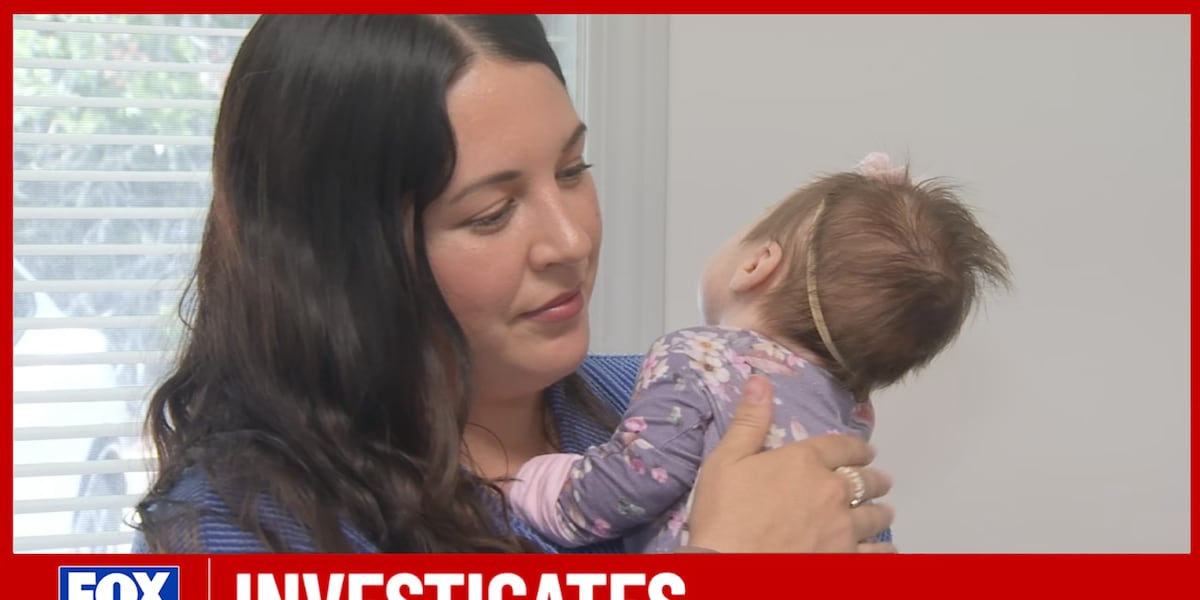South Carolina and Georgia receive an F for maternal and infant health

GREENVILLE, S.C. (FOX Carolina) – A recent report by the March of Dimes says South Carolina and Georgia are failing moms and babies. It gave the states an F in its maternal and infant health report card. Fox Carolina investigates what is going on and what some possible solutions are.
Every two weeks, mother Andrea Randall takes a 40-minute drive. She goes from Hart County, GA, to Seneca, SC, so her daughter Ryder can see a pediatrician.
“It’s not ideal, that is for sure,” Andrea Randall said. “It’s wild that it is this hard to find a doctor, especially when you have good insurance. It is wild that it is that difficult.”
According to the Georgia Alliance of Community Hospitals, Hart County is one of 63 in Georgia without a pediatrician.
“My only options were to go all the way to Athens, GA, which is about an hour, or to come up here to South Carolina, Seneca, or Anderson.
Pediatrician Carey Gully shares her sympathy.
“I remember my mom driving me to Greenville for my annual physical or to get my shots,” Dr. Gully said.
Dr. Gully said that was about an hour drive. She says when she grew up in the Seneca area as a child there were no pediatricians. It’s why she wanted to open a practice.
“I wanted to come back home and work where I grew up,” Dr. Gully said.
But doctors like Dr. Gully are hard to come by. Mother Julie Crowe lives in Laurens, SC, and has also had to travel far for her child.
“Our first two were born at Laurens Hospital,” Crowe said. “It was a really good experience.”
Crowe says her first two births were a 20-minute drive to the nearest hospital. But two years ago, Prisma Health in Laurens closed their labor and delivery room. When she was pregnant with her 5th child, she had to drive 50 minutes to Greenville. It’s a drive she still remembers.
“Every bump I felt and just having to breathe, we saw the signs for it, the hospital, and I had a feeling that I had to push,” Crowe said. “I thought, I do not want to have this baby in this car, and I was just trying to hold her in.”
Luckily, she made it, but says this long drive could put women and their babies at risk. According to a report by the South Carolina Institute of Medicine and Public Health, mothers in rural areas have a 62% higher chance of pregnancy-related death compared to urban areas. Laurens County is included.
“If there is something wrong, you can’t waste time, you have to go quickly and get checked out to make sure you and your baby are okay,” Crowe said. “Time is of the essence.”
Data from the U.S Census Bureau shows the populations of Laurens, Oconee, and Hart counties have all grown by 4-8%, meaning people are moving to the area with fewer doctors. Dr. Gully says she has a hard time recruiting physicians and healthcare workers at her practice.
“There are not a lot of job opportunities for their spouses, unless they are affiliated with the local university or plants,” Dr. Gully said. “A lot of them are younger and trying to further their education in bigger cities, so it is difficult to recruit new help.”
Dr. Gully said it would be helpful if there were more incentives to work in rural areas.
“I know when I came, I got a rural health stipend, and that helped me pay off my student loans, so that was really helpful,” Dr. Gully said.
Dr. Gully says there are also challenges doctors’ offices face when it comes to insurance reimbursement and medicaid claims. This may hinder some doctors from opening their own practice in a rural area.
Randall says she is getting ready to return to work and is glad her employer is flexible.
“This has been very eye-opening for me,” Randall said. “I can’t imagine having a different career or a different job where you have to kind of find time or request time off work because you have to drive far.”
She loves Dr. Gully, but hopes someday her drive isn’t so far.
“I would love if this were closer to home or if I had more options in general,” Randall said. “It has been kind of a shock to find out there is not.”
The South Carolina Institute of Medicine and Public Health has an action plan they say will improve rural healthcare.
- Ensure prenatal and postpartum care is within 30 miles of a person’s home or work
- Expand reimbursement programs and pay for those who work in rural areas
- Address transportation issues and barriers for high-risk moms or babies.
Copyright 2025 WHNS. All rights reserved.
link







